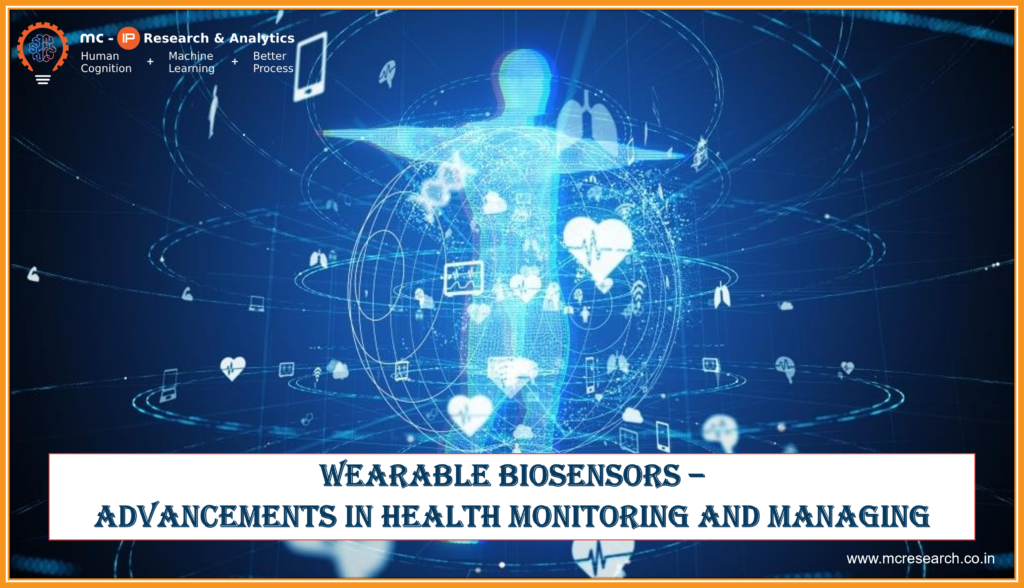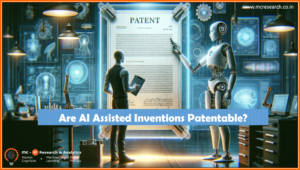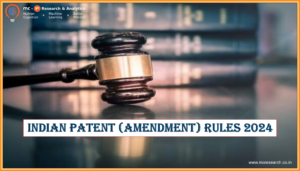The development of wearable biosensors has largely changed the face of healthcare through real-time monitoring and management of physiological parameters of patients. The incorporation of cutting edge technologies into wearable biosensors has paved way for personalised healthcare transforming the landscape of healthcare.
From Vital Signs to Biomarkers
Biosensors have come a long way from using wearable biosensors for tracking basic vital parameters like heart rate, breathing and sleep patterns to detecting specific biomarkers from sweat or interstitial fluid analysis. Companies like Kenzen are developing wristbands or a simple skin patch which can measure glucose levels through sweat analysis for real-time glucose monitoring for diabetics and pre-diabetics. Similarly, smart contact lenses using biosensors are used for analysis of tears to detect biomarkers in blood chemistry.
Wearable biosensors with AI and Algorithmic Power
The amalgamation of wearable biosensors with artificial intelligence has opened new avenues in field of intelligent health monitoring systems enabling rapid analysis of huge amounts of health data. AI based wearable devices are equipped to detect subtle changes in physiological parameters, aiding in early detection of health issues using predictive analysis and facilitating proactive healthcare management using personalized dosing
Predictive Analytics:
AI algorithms in wearable devices can analyse historical health data along with real-time information to predict potential health issues in a person. For example, AI based smartwatches can predict an asthma attack based on subtle changes in your breathing patterns and environmental triggers.
Personalized Dosing:
AI algorithms based biosensors helps in optimizing medication dosages based on individual health metrics and prompts the connected smart inhalers or pill dispensers to make real-time adjustments in medicine dosages, leading to effective treatment outcomes.
Wearable biosensors - Beyond Monitoring, Towards Intervention:
The role of wearable biosensors is now not confined to just passive monitoring but have extended to active intervention. Previously, these devices were primarily used to passively monitor physiological parameters like heart rate, activity levels, or glucose levels. However, with advancements in technology, wearable biosensors are now capable of actively intervening in a person’s health by delivering targeted treatments or therapies based on real-time data gathered from the body
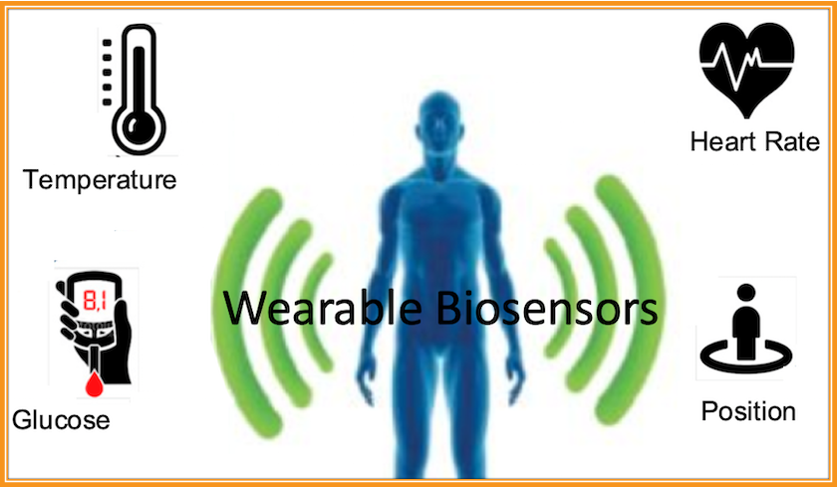
Biocompatible Microdosing:
Researchers are developing microneedle patches embedded with tiny reservoirs of medication to deliver precise doses of medication into the bloodstream in response to real-time biosensor data. This technology holds promise for treating chronic pain, diabetes, drug and alcohol addictions. For example, a microneedle patch developed by Stanford University scientists helps in providing accurate vaccine dosages, at a given time interval and proves to be more effective than vaccine shots.
Bioelectrical Stimulation:
Wearable biosensors are used for providing personalized therapy for chronic pain by delivering targeted stimulation based on individual needs and real-time bio-feedback. They are widely used in devices like TENS (Transcutaneous Electrical Nerve Stimulation) units for pain management.
Rise of Smart Fabrics
The integration of biosensors with smart fabrics has introduced a new realm in the field of health monitoring. Smart textiles embedded with biosensors is used to develop a non-intrusive and comfortable way to continuously monitor health metrics. These textiles can be seamlessly incorporated into everyday clothing, offering a continuous health monitoring solution without the need for any external devices. For example, an “intelligent T-shirt,” developed by Spanish scientists at Spain’s Universidad Carlos III de Madrid, is able to monitor the physiological parameters of the user and provide alerts to a wireless device.
Top companies pioneering in wearable biosensor technology
According to the intellectual property (patent) data, top players in the field of health monitoring using wearable biosensors are Samsung, Philips, Fitbit, IBM, Zoll Medical, Apple, Medtronic, Huawei and Google. Samsung offers a variety of wearable health and fitness trackers, including the Galaxy Watch Active2, which can track heart rate, sleep patterns, and activity levels. Similarly, Apple developed the Apple Watch, a smartwatch that can track heart rate, activity levels, sleep patterns, and blood oxygen levels. Other companies like Fitbit, Google, and Huawei also offers a range of wearables for monitoring physiological parameters.
The patent filing trends of top companies for past ten years is depicted in the table given below.
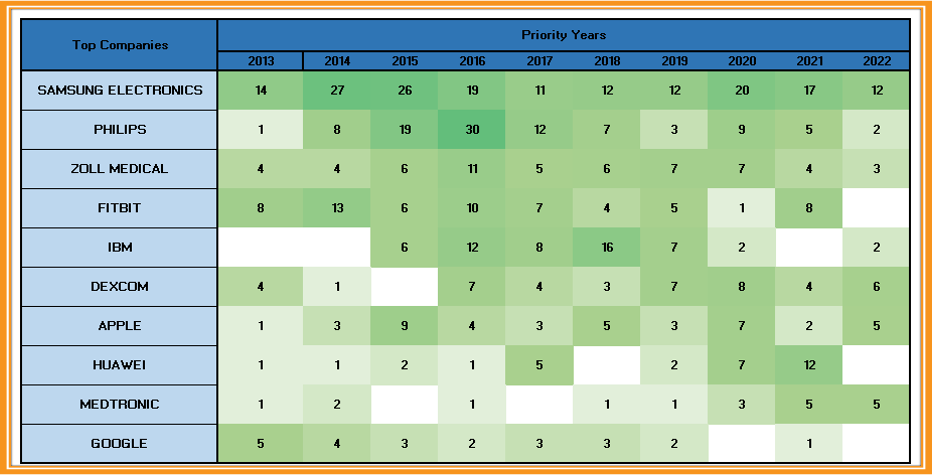
Challenges and Opportunities:
Privacy and Security:
Wearable biosensors collect a vast amount of sensitive health data. To address the issue of misuse of these sensitive data, robust data security measures and clear privacy policies are essential to ensure patient’s trust. Blockchain technology and other advanced cryptographic systems offer promising solutions for secure data storage and analysis by providing tamper-resistant platforms that ensure the integrity, confidentiality, and privacy of sensitive health data collected by wearable biosensors.
Equal Accessibility:
The price point and complexity of these wearable biosensors sometimes makes it inaccessible to low-income communities and individuals with limited technological knowledge. Development of affordable and simplified devices are needed to bridge the digital gap and to provide equitable access to these life-changing technologies.
Why MCRPL?
MCRPL’s innovative integration of AI and human expertise (MCRANK) offers a distinct edge in the field of patent searches. This synergistic approach not only ensures efficiency and accuracy but also taps into the nuanced understanding that human experts bring to the table. By harnessing the power of cutting-edge AI tools alongside seasoned professionals, MCRPL delivers comprehensive, precise, and timely results for its clients. This unique blend of technology and expertise is assured to revolutionize the patent search process, making MCRPL a trusted partner for businesses and innovators seeking to safeguard their intellectual property and drive forward in an increasingly competitive market.
With plenty of experience of working on wearable and biosensor domains, MCRPL can bring out actionable intelligence and can also forecast the roadmap for wearable industry in the coming future. MCRPL has the right talent and expertise on the subject matter as well as on technical knowhow to quench your thirst in the R&D space.
© Molecular Connections Private Limited
For more information, contact priorart@molecularconnections.com
For more updates subscribe IP Tech Insider
Also, you can place an order for your search on our online portal: https://ipsolutionshub.com/

